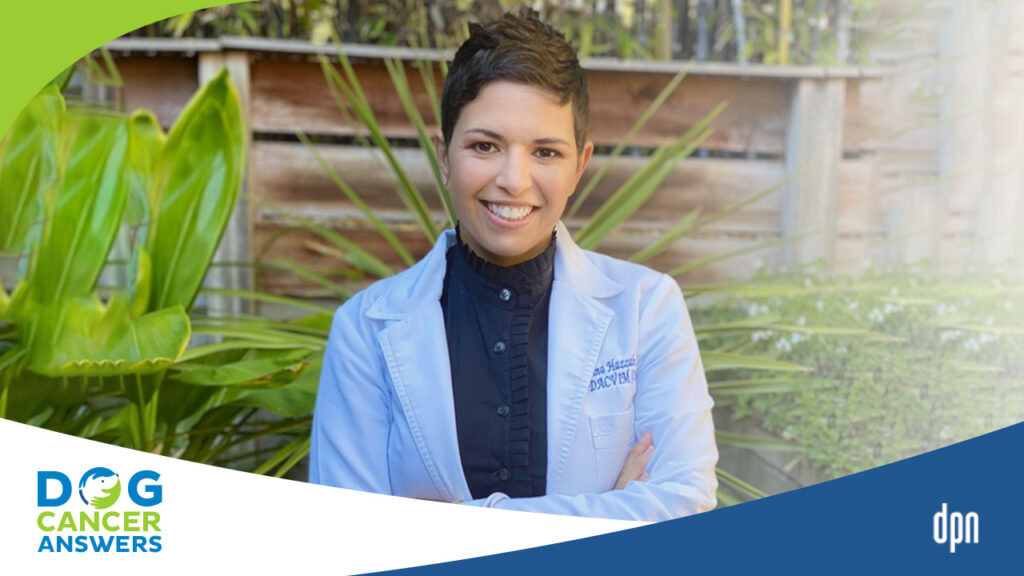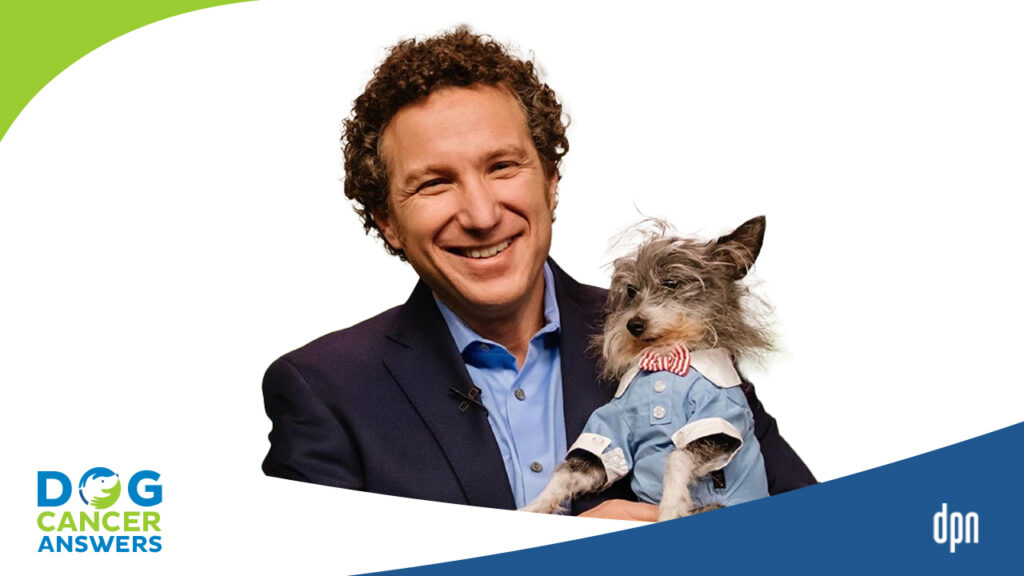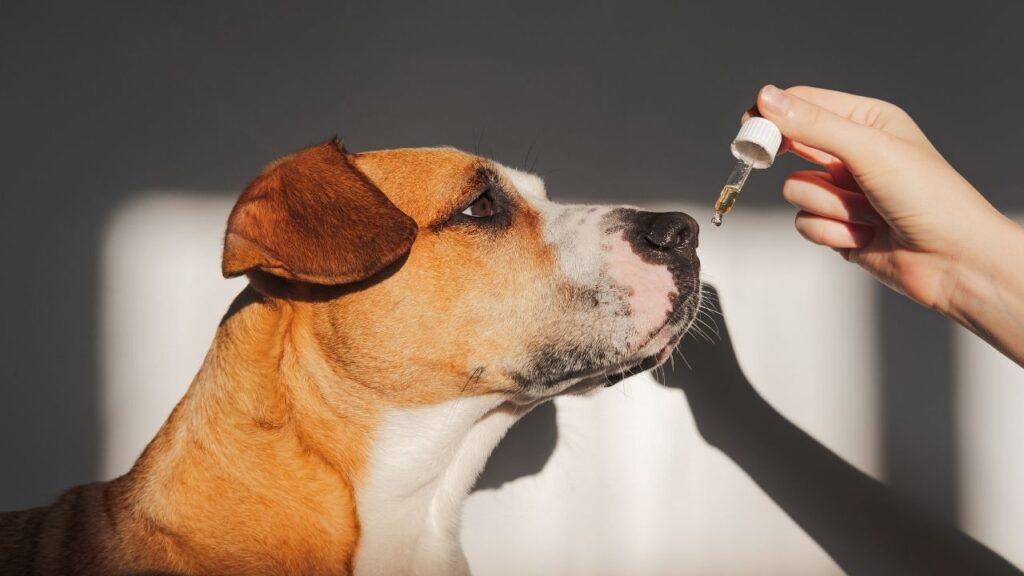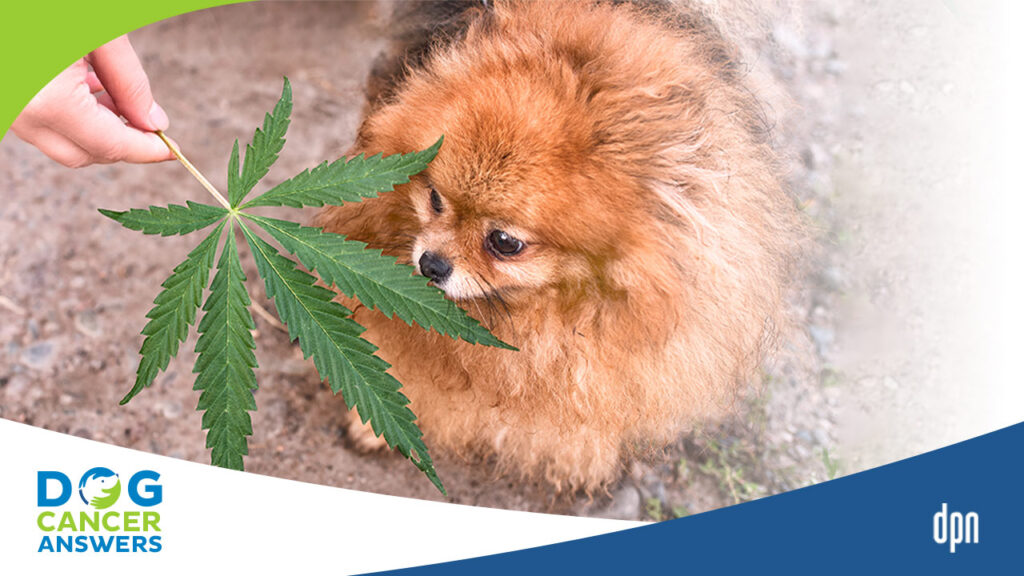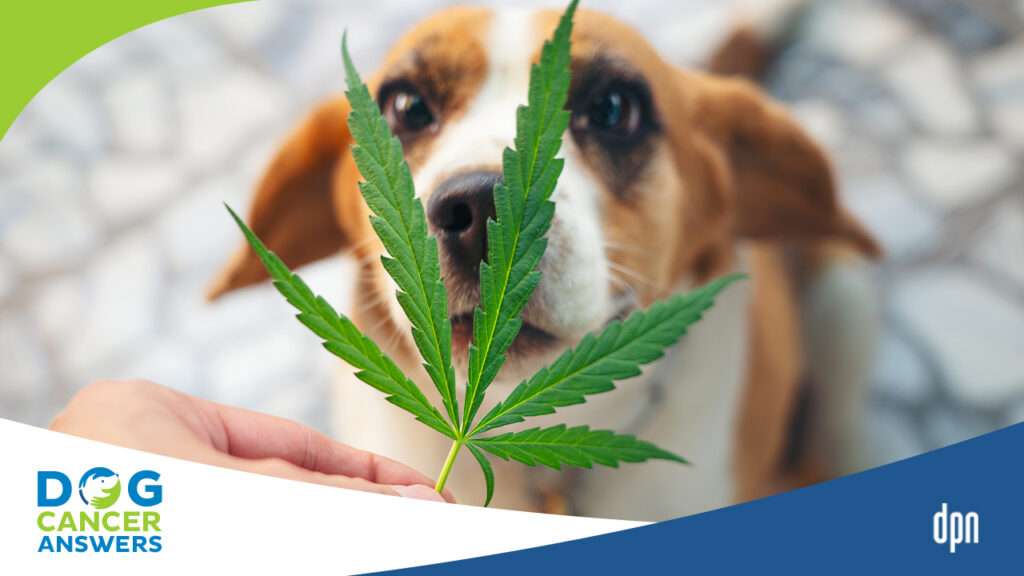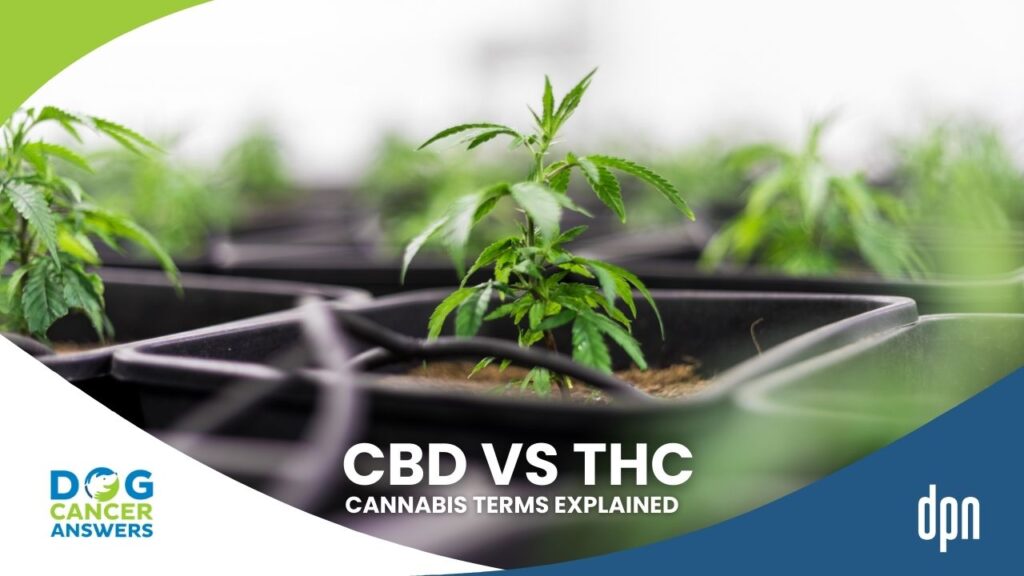EPISODE 52 | RELEASED May 8, 2020
CBD Oil for Dogs │ Dr. Demian Dressler Deep Dive
There is evidence that CBD has anti-cancer effects, anti-inflammatory effects, anti-anxiety effects, anti-seizure effects, and even anti-glaucoma effects. So why aren’t more vets recommending it? Well, for lots of reasons, it turns out.
SHOW NOTES
Host James Jacobson guides us through a wide-ranging and fascinating Deep Dive episode with guest Dr. Demian Dressler, co-author of our podcast sponsor, the book The Dog Cancer Survival Guide: Full Spectrum Treatments to Optimize Your Dog’s Life Quality and Longevity.
Links Mentioned in Today’s Show:
Here is the manufacturer’s website for Epidiolex, the CBD-based anti-seizure medication approved by the FDA for use in children with specific types of seizure.
You can reach out to Dr. Demian Dressler directly on his veterinary hospital’s website: https://VetinKihei.com.
>> Dr. Demian Dressler: The cannabinoids, and CBD specifically, do have some evidence for having anti-cancer effects. That is absolutely true. There is anti-inflammatory effects. That’s absolutely true. Depending on what you’re looking at, which constituent, there’s anti-anxiety effects, there’s anti-seizure effects, there’s anti-glaucoma effects. There’s all of these effects that are all over the board that are absolutely real and seem to be absolutely legitimate. As a matter of fact, there’s a drug that just came out the end of last year that’s used for seizure control, and basically it’s CBD, it’s the FDA’s approved CBD.
>> Announcer: Welcome to Dog Cancer Answers, where we help you help your dog with cancer. Here’s your host, James Jacobson.
>> James Jacobson: Thank you for hitting play. I am so glad you’re here. —Because TODAY we are tackling one of the more thorny, controversial subjects that people are talking about—and sometimes in very hushed tones—and sometimes: in very animated over-the-top ways. We are talking about CBD oil and using it with dogs that have been diagnosed with cancer. Should you be using it with your own dog?
Well, as is often the case when it comes to dog cancer, that is not a simple yes or no question. To untangle the many issues around CBD, we are turning to Dr. Demian Dressler for a Deep Dive conversation.
Dr. Demian Dressler is co-author of the bestselling book, The Dog Cancer Survival Guide. He is a graduate of the Cornell School of Veterinary Medicine and he’s been in private practice since 1997. Dr. Dressler, welcome.
>> Dr. Demian Dressler: Thank you.
>> James Jacobson: Today we’re going to discuss something that is also really popular these days, which is this whole concept of using CBD oil or CBD in cannabis and hemp for dogs diagnosed with cancer.
First of all, what is CBD?
>> Dr. Demian Dressler: Well, CBD is an abbreviation and it stands for cannabidiol. And it’s a active compound, the substance that’s found in cannabis, which is marijuana plants.
>> James Jacobson: Okay, and why do people want to use CBD for dogs these days?
>> Dr. Demian Dressler: I think a lot of it has to do with the fact that it’s getting a lot of press and a lot of human beings are using it. And so we
>> James Jacobson: And why are they using it?
>> Dr. Demian Dressler: Well, for a number of different reasons, but I think that one valid legitimate reason is that it does help people. Many times they do find some benefit from it. And because there are some properties about CBD and also the other cannabinoids from marijuana that do indeed have legitimate effects.
And we see this not only in test tubes and petri dishes, but also in laboratory animals and also in people.
So what’s happening is we’ve got a lot of people out there who honestly are benefiting from the use of these products, and it’s only natural if something is beneficial for us — because we are guardians of dogs that we love and they’re our family members — for us to start thinking about those same benefits, and maybe we can do that for dogs.
>> James Jacobson: And it’s a plant. It’s a natural plant.
>> Dr. Demian Dressler: That’s right. It’s a natural plant. So the idea, and you’ve probably heard me before talking about this subject of natural versus unnatural or synthetic, there is a pink cloud around the idea of “something being natural, therefore, it is something that is good.”
And I deal with this a lot in my consulting clients — like people will call me from time to time and if I have time, I’ll do consults with them — and one of the themes that I see as a recurring issue is that they want something “natural” because “natural is good, and natural is safe.”
And the truth of it is that in some cases that’s true and real and factual, and valid, and in some cases that’s completely wrong.
And so using that kind of way of thinking leads to a lot of confusion that is not beneficial for anybody in the family, certainly including the dogs, because sometimes it’s beneficial and sometimes it’s not beneficial.
So if you look at, for example, a lot of chemo drugs, chemotherapy, drugs, those drugs are very, very close to naturally-occurring compounds.
As a matter of fact, it’s one of the most common ways that pharmaceuticals are developed, is by slightly modifying and extracting natural compounds.
>> James Jacobson: They go into the rainforest and find these natural compounds, then find a synthetic way to recreate them in the lab.
>> Dr. Demian Dressler: Yeah, and just, you know, just a little bit, not much.
So you can get the patent, number one, and that preserves your market share and so can make more money.
And then number two, because you don’t want to lose too much of the quote unquote “natural effect.”
But guess what? There’s also side effects. The side effects of the pharmaceuticals is not simply because they’re manmade.
The side effects of the pharmaceuticals is because we’re using things that are naturally found in nature that happen to have bad side effects in bodies. That’s actually how that works. That’s how we can have toxicities in nature. That’s how we can get stung in nature and something bad happens to us.
>> James Jacobson: Okay, so, so just ‘cause it’s natural doesn’t mean it’s good.
>> Dr. Demian Dressler: That’s right.
>> James Jacobson: But the big question is, is CBD good for dogs with cancer?
>> Dr. Demian Dressler: Complicated question. Very complicated. So there’s a couple of aspects here that I’ve got to bring up.
One, it’s very difficult for me to recommend it because there is a legal environment where I can endanger myself by recommending the use of CBD.
And the reason why is because CBD products are still illegal on a federal level in spite of what’s going on on a state level. And guess who gives medical professionals their license, their pharmaceutical license?
>> James Jacobson: The Feds.
>> Dr. Demian Dressler: It’s the Feds, it’s the Drug Enforcement Agency. It’s the DEA, that’s a federal agency. And the regulation, as far as the CBD products, in spite of what you’ll read, is still to this day, Schedule I. Schedule I — those substances are classified in the same group as things like heroin.
So if I were to go around advocating the use of heroin, and facilitating obtaining heroin, or selling heroin in my dog cancer patients, I would be breaking the law. And right now the legal counsel is on this subject: veterinarians who are out there promoting CBD could face rather severe penalties, including loss of our pharmaceutical license from the DEA due to our law-breaking activities.
>> James Jacobson: Okay, so where does that leave us? You can’t really talk about it.
>> Dr. Demian Dressler: So I can’t recommend it, but I can talk about it.
>> James Jacobson: Okay.
>> Dr. Demian Dressler: So back to the question well, is it good or is it bad?
>> James Jacobson: Yeah?
>> Dr. Demian Dressler: Don’t know yet. The reason why we don’t know yet is multifaceted. We definitely have evidence in test tubes and petri dishes that the cannabinoids, which by the way, there are a huge number of them above and beyond CBD — these are all active compounds from the cannabis plant, CBD is just one of many, many, many different active compounds — and each of those compounds is capable of doing something in a living body.
But in test tubes and petri dishes, we see, “Oh yeah, we’re killing cancer cells.”
Okay, great.
But you know what, you could probably put grass clippings in a test tube and a petri dish and it would probably kill cancer cells, honestly.
Or you put enough sugar in there, it’ll kill cancer.
>> James Jacobson: This is the whole in vitro versus in vivo discussion.
>> Dr. Demian Dressler: Right. So “in vitro” means “in glass” and “in vivo” means “a living body.” So if you put something in in vitro, you have a hugely high rate of killing cancer cells, so one can invoke “this is an anticancer substance” for so many different things, but then when you try to use it in the living body, all of these different questions come up.
Is it available? Can it get to the tumors? Can it penetrate the cancer cells? Is enough getting there? Does it get broken down by the liver? Does it get peed out in the urine? All this stuff happens.
So it’s not at all as if we see that things that kill cancer cells in a test tube are going to kill cancer cells in the living body. That’s not true.
The second reason why things get confusing is that there’s a whole variety of cannabinoids, right? And so they’re doing different things. So CBD is one compound. THC is another compound. Tetrahydrocannabinol. That’s the intoxicant that people get stoned with.
>> James Jacobson: That’s the thing that makes people high.
>> Dr. Demian Dressler: Right. Different products have different amounts of THC in them, also, and the different products also have CBG in them, and the different products also have cannabinol in them.
And so, what’s going on? We don’t really know what’s going on in a given product because the standardization is not there yet.
And furthermore, if you look at these different products and you’ll see, they don’t have the testing to ascertain that the amount of what they’re saying in there is true. Third-party testing. That’s a very useful thing to look at. You gotta look at what’s actually in these things, and if they’re not bothering to test, you don’t really know.
And it turns out that the FDA has been looking at this because the FDA is not happy at all about these products. They’re finding, honestly, that a lot of the products don’t have at all what they’re claiming that they’re having.
>> James Jacobson: Well, discuss that issue of standardization and third-party testing. Cause that’s kind of an interesting thing that most people don’t even think about when they go to a store and pick something up.
>> Dr. Demian Dressler: Right. So when you’re looking at, for example, a dietary supplement, there’s a statement being made that there’s a certain amount of whatever desirable substance that you’re getting when you buy it per dose. It’s got to have a certain amount in there. And the problem is, is that unless that’s actually being looked at and tested, we find that actually that could not be the case at all, for a number of different reasons.
One could be an economic reason. “Oh, we’ll shave off a little bit. Nobody’s going to know.”
Or it could be there’s something lost in processing, or breakdown due to the storage of the different ingredients. There’s a lot of different reasons why that can come about.
And the cannabinoid type products by the way, are extremely sensitive to heat degradation and heat processing and age. It just sits there on the shelf, say, for example, for five years, or if it’s exposed to light, there’s all these stability issues that can happen, and if that’s not being looked at, and if a consumer is not savvy in this way, you could say like, “well, I’m buying this stuff and it’s supposed to have all these beneficial effects, but actually I’m really buying one 10th of what I think I’m buying.”
And so it can be completely not deliberate. It can just be a matter of storage or processing or, you know, decomposition over time and things like that.
>> James Jacobson: That is interesting. And, actually, this also is a good place to take a break—but when we come back, I want to get back to the science of why people are interested in CBD products in the first place. More right after this.
Today’s episode of Dog Cancer Answers is brought to you by the best-selling animal health book, The Dog Cancer Survival Guide: Full Spectrum Treatments to Optimize Your Dog’s Life Quality and Longevity by Dr. Demian Dressler, our guest on today’s show, and Dr. Susan Ettinger (an oncologist in New York). And in a minute I will tell you how to get their book at a discount.
And if you think CBD oil is “outside the box,” and you’re interested in open-minded medicine, you will love this book. That’s because Dr. Dressler does not rely only on what he learned two decades ago at Cornell University. He combines the latest research with tried-in-the-trenches information to pack a LOT of what he calls Full Spectrum medical advice into this 500-page book.
Full Spectrum means no dogma. If it’s something that is helpful and it’s from a big pharmaceutical company, it’s in the book. On the other hand, if it’s something that is helpful and it’s from a different medical tradition, or even is just a lifestyle adjustment, it’s in the book. What you get is no polarization, just a solid base of information about all the things that have been shown to work in dogs with cancer.
For example, the book covers everything that you need to know about conventional veterinary treatments—that’s surgery, chemotherapy, and radiation—including how to reduce their side effects. The most effective non-conventional options, including botanical nutraceuticals, nutrition and mind-body medicine, as well as how to analyze the options and develop a specific plan for your own dog based on your dog’s type of cancer and your dog’s age, and your financial budget, and your time constraints, as well as your personality.
The Dog Cancer Survival Guide is available wherever fine books are sold– both online and in physical bookstores. And podcast listeners can support this show by using a coupon code and getting The Dog Cancer Survival Guide right away direct from the publisher. It is available either in paperback (and there is free shipping anywhere in the USA), or as an e-book edition that is under ten dollars.
The website to get either the paperback or the ebook is: www.DogCancerBook.com. And you will save 10% if you use the promo code “podcast” when you check out, you’ll save 10%. The website again: DogCancerBook.com and use that promo code “podcast” for 10% off. That is www.DogCancerBook.com.
OK, we’re back with Dr. Demian Dressler, and we’re talking about CBD oil. So Dr. D, let’s go back to the science. So, I know you can’t recommend it, but what does the research say in terms of anti-cancer benefits?
>> Dr. Demian Dressler: Right. So the cannabinoids and CBD specifically do have some evidence for having anti-cancer effects. That is absolutely true. There is anti-inflammatory effects. That’s absolutely true.
Depending on what you’re looking at, which constituent, there’s anti-anxiety effects, there’s anti-seizure effects, there’s anti glaucoma effects. There’s all of these effects that are all over the board that are absolutely real and seem to be absolutely legitimate.
As a matter of fact, there’s a drug that just came out the end of last year that’s used for seizure control, and basically it’s CBD. It’s the FDA’s approved CBD.
>> James Jacobson: This goes back to what you were just speaking about earlier when you were saying someone has taken a natural substance, changed it a little bit, and created a molecule that is now a drug?
>> Dr. Demian Dressler: That’s right.
>> James Jacobson: A patented drug?
>> Dr. Demian Dressler: And honestly, it’s Epidiolex and I don’t think that they’ve even changed it all that much. Purifying, standardizing, synthesizing, whatever. I think that’s just a given amount of CBD and it’s packaged and labeled and it’s used for a certain type of seizure control in kids.
>> James Jacobson: Epidilex?
>> Dr. Demian Dressler: Epidiolex.
>> James Jacobson: Now, is that used in veterinary medicine?
>> Dr. Demian Dressler: No.
>> James Jacobson: No. Okay.
>> Dr. Demian Dressler: It’s, well, first of all, it’s brand new.
>> James Jacobson: Okay.
>> Dr. Demian Dressler: It just got released the end of last year and it’s a very specific indication and that is seizure control. Particularly seizure control in children for certain form of epilepsy that I can’t remember the name of, but it’s an unusual form of epilepsy.
But if you go and you read about people’s experiences using CBD products in children, you’ll see there’s all of these different anecdotes where these kids are having their seizures controlled by the use of CBD. So it’s — no doubt it’s doing something. Without a doubt.
So there are some studies done in dogs with the use of, of CBD, particularly the anti-inflammatory effects.
And there is study done in dogs, and it showed, “yeah, gee whiz, it gets rid of arthritis pain, which is inflammatory based.”
Oh. It’s actually working as an anti-inflammatory in the body. And we know for a fact that inflammation is part and parcel of cancer development and progression.
Those two things are linked completely. And so, a ha, that’s why many times people use pharmaceutical anti-inflammatories in veterinary cancer patients and human cancer patients because it benefits longevity and life quality.
That was one of the reasons, for example, for including the constituents in Apocaps that I designed for my patients. Well, those botanical compounds inhibit the exact same enzymes in the body that the pharmaceutical anti-inflammatories do. So they’re naturally occurring anti-inflammatories. Well, why would you use that in your patients?
Because it’s beneficial for them. And so CBD happens to have some of that same effect.
But interestingly, if you look at those same publications, CBD also elevated liver markers in these dogs that were being used — CBD was being used for pain control. It kicked up their liver markers. That’s not good.
>> James Jacobson: That’s a negative thing, yeah, that’s a bad thing.
>> Dr. Demian Dressler: Yeah. So when we look at blood markers in the bloodstream, those are markers of organ disruption, cell disruption. They spit out these markers in the blood that you can pick up. So when you look at a blood test, you say, “Oh, the liver markers are up. Well, something’s happening over there in those liver cells, they’re spitting out molecules that they don’t usually spit out.”
Something’s going on. And that something, when we’re looking at liver markers, maybe disease, or maybe changed metabolism, we’re not quite sure. But if you look at a drug like prednisone, cortisone drugs, they’ll kick up the liver markers too.
And it’s not always dangerous, ‘cause there’s something called enzyme induction, which is where the liver cells will spit out those markers as a consequence of being stimulated by the drug, the cortisone drug in this case, but it’s not really connected with true disease.
It’s not quite perfectly healthy, but it’s not quite — like the liver is doing fine, and you’ll see pretty high markers and liver’s like actually not doing too badly at all. So is CBD creating that benign elevation?
I’m not saying that the cortisone drugs are good across the board by no means, but you can have that particular phenomenon of liver marker induction that’s not that bad for the dog, but it may be that CBD is capable of doing that exact same thing in the liver.
What I can say for a fact is that CBD does something to dog livers. That’s true. How bad that something is? I don’t know. And none of us do.
Toxicities from CBD over-consumption are almost zero. However, lots of dogs do die from eating edible marijuana-related products, mainly because they’re in things like brownies.
>> James Jacobson: Well, that was going to get to my next question. What about marijuana products? Are they safe?
>> Dr. Demian Dressler: Yeah, so it’s very hard to kill a dog through an overdose of cannabis products specifically. It has happened, but it’s hard. Now, they can get in trouble, but fatalities? There’s very, very, very few. But when they eat things like marijuana brownies, and many of us are aware out there that —
>> James Jacobson: People put that in brownies? You’ve heard of that, huh?
>> Dr. Demian Dressler: No.
>> James Jacobson: No. Okay.
>> Dr. Demian Dressler: That’s not true. ??
The dark chocolate is toxic for dogs, and so if you eat enough dark chocolate, if you’re a dog, you can die. And that’s one of the reasons I think for the toxicities that may be reported out there — connected with consumption of marijuana edibles — is there happens to be dark chocolate in a lot of them.
Because it’s really weird most of the time — unless you’ve got a crazy busy body dog — for those dogs to go out and like consume a whole bunch of, you know, marijuana itself, or whatever – the point is that the baked goods happen to taste really good, and so the overdose scenarios are much more likely in those cases. And they’re also getting dark chocolate, which is toxic.
>> James Jacobson: So you’re not recommending CBD and you’re not recommending marijuana either?
>> Dr. Demian Dressler: No, I really can’t recommend it for legal reasons. And so that’s my official position on it.
>> James Jacobson: Well, let’s talk about that. Why has it become so difficult for vets to discuss CBD?
>> Dr. Demian Dressler: Well, you know, for the reasons that I discussed in relation to the pharmaceutical licensing, um, first of all, we have a regulatory issue that’s, I don’t know how old it is, so I don’t know when exactly marijuana and marijuana products got classified as Schedule I.
I have a feeling in the ’30s or ’40s, but I really am not quite sure on that. But that’s the central issue.
It’s a gross misclassification because there’s absolutely no reason why either marijuana or substances that contain the constituents of marijuana — ought to be treated as if they were heroin and these other heavy-duty drugs.
So that’s the first thing. There’s also a tremendous internal lack of consistency and coherence in the regulatory environment.
And the reason for that is, if it’s true that marijuana-derived compounds are as bad for you as heroin, why the heck would you grant an FDA license to that exact same substance for treating a medical condition?
>> James Jacobson: You mean Epidiolex, the anti-seizure med for kids we talked about earlier that’s basically CBD.
>> Dr. Demian Dressler: Right. Why would you do that? It doesn’t make any sense.
Furthermore, if you look at like opioids in this way, we can see that opioids, in general, tend to be very harmful and very addictive. Yet, those are permitted and allowed.
And so, I’m not quite sure from an overarching standpoint about the — I, I can’t say that the pharmaceutical industry is altruistic as its motivating factor. I don’t think that it’s, that’s the prime thing going on.
>> James Jacobson: That’s probably not the main motivation behind big pharma. Okay. So just to wrap up, when it comes to CBD and dogs with cancer, your thoughts are …
>> Dr. Demian Dressler: I’ll put it to you like this. There have been some successes out there. I can’t recommend it for legal reasons.
My opinion of the entire field is that we have to do more work, because the standardization and dosing thing — if we disregard the legal environment entirely, the dosing issue and the standardization issue and the liver marker issue needs to be addressed, I think.
As a veterinarian, I need to present something that’s going to be safe and effective most of the time within my abilities, and I think we need a little bit more work in that regard before carte blanche saying “CBD is good for dog cancer.”
>> James Jacobson: Dr. Dressler, thank you.
>> Dr. Demian Dressler: Thank you.
>> James Jacobson: I want to thank Dr. Dressler for that Deep Dive into CBD oil. I know it’s pretty frustrating topic for a lot of us, because it seems like so many people are using and selling CBD oil, so why should we be skeptical? Why would sellers be taking such risk, if it weren’t yet legal, and if it weren’t helpful?
My takeaway is that there is enough potential there that we should be finding out a lot more about how CBD works, and how to dose it, and what potential side effects there are, as well as how to manage them. It sounds like the unregulated industry is also not necessarily producing uniformly great products.
So, as with most things dog cancer, it is best to consult with your own veterinarian about CBD and using it with your dog, and what specific products they may recommend. And if your veterinarian doesn’t want to or won’t make a recommendation, please understand that many veterinarians are legitimately afraid to lose their DEA licenses. That would kill their practices and their ability to care for all of our dogs. So until marijuana and CBD are no longer technically Schedule I drugs, we’re all going to be in this pickle.
We’ve put links to an article that Dr. D wrote on CBD for DogCancerBlog in the shownotes for today’s episode, as well as other links that you will find helpful. Definitely check out the show notes for this episode, which are in your podcast app or online at DogCancerAnswers.com/CBD.
If you’re enjoying Dog Cancer Answers, the best way that you can support this free podcast for dog lovers facing dog cancer is to subscribe in the app of your choice and tell a friend or even your own veterinarian about the show. The more ratings, and reviews, and listens, and subscriptions we get, the higher we get ranked, and the more likely other people are to find us just when they really need us.
And hey, if your veterinarian is like our other veterinary guests on this show, open-minded and non-judgmental about treating dog cancer, tell them to reach out to our producers and they can be a guest on a future episode of Dog Cancer Answers.
–TOUCH TONE SFX–
Those touch tones mean only one thing, which is that we want to hear from you. ‘Cause if you have a question for a dog cancer veterinarian, you can ask it on a future episode of Dog Cancer Answers. To record your question for one of our guests on a future episode, just call our listener line. The telephone number Is 808-868-3200—that is 808-868-3200—or visit our website at DogCancerAnswers.com.
And if you have an inspiring True Tail to share with us, please tell us your success story on DogCancerAnswers.com
On our website, you can also listen to or download our back catalog of episodes. It is the best way to get the information you need to help optimize your dog’s life quality and longevity.
And in a moment I will tell you about our next deep dive episode about chemotherapy, but first…
We’d like to take a moment to thank our sponsor: The Dog Cancer Survival Guide book by Demian Dressler and Sue Ettinger. It’s available wherever fine books are sold both online and in physical bookstores. And remember, if you’d like to help support this show, get the book today– direct from the publisher. The website to do that: DogCancerBook.com and use the promo code “podcast” and you’ll save 10% off. That is www.DogCancerBook.com.
So I hope you will join us for the next Deep Dive episode of Dog Cancer Answers, where we are talking to Dr. Sue Ettinger about chemotherapy: everything that you want to know but were afraid to ask. If you’re worried about side effects, or cost, or whatever – this is an important episode to listen to.
And the best way to make sure that you get it as soon as the episode is dropped is to subscribe to Dog Cancer Answers in Apple Podcasts or your favorite podcast app. We’re also on Spotify and YouTube.
I’d like to thank Dr. Demian Dressler for being our guest today. If you’d like to reach him, his website is www.VetinKihei.com, that is Vet in Kihei, spelled K-I-H-E-I, dot com. And until next time, I am James Jacobson. From all of us here at Dog Cancer Answers & Dog Podcast Network–I wish you and your dog a warm Aloha.
>> Announcer: Thank you for listening to Dog Cancer Answers. If you’d like to connect, please visit our website at DogCancerAnswers.com or call our Listener Line at 808-868-3200.
And here’s a friendly reminder that you probably already know: this podcast is provided for informational and educational purposes only. It’s not meant to take the place of the advice you receive from your dog’s veterinarian. Only veterinarians who examine your dog can give you veterinary advice or diagnose your dog’s medical condition. Your reliance on the information you hear on this podcast is solely at your own risk. If your dog has a specific health problem, contact your veterinarian.
Also, please keep in mind that veterinary information can change rapidly. Therefore, some information may be out of date.
Dog Cancer Answers is a presentation of Maui Media in association with Dog Podcast Network.
Hosted By
SUBSCRIBE ON YOUR FAVORITE PLATFORM
Topics
Editor's Picks
CATEGORY



